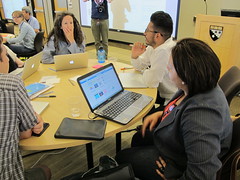 Here are 5 assessment for learning techniques you may wish to try out. They are generic, but I think they are especially useful in the context of Computing and ICT. As well as my own work and experience, I have drawn on
Dylan Wiliam’s book, Embedded Formative Assessment, Black and Wiliam’s Inside the Black Box.
Here are 5 assessment for learning techniques you may wish to try out. They are generic, but I think they are especially useful in the context of Computing and ICT. As well as my own work and experience, I have drawn on
Dylan Wiliam’s book, Embedded Formative Assessment, Black and Wiliam’s Inside the Black Box.5 Assessment for Learning techniques for ICT or Computing
 Here are 5 assessment for learning techniques you may wish to try out. They are generic, but I think they are especially useful in the context of Computing and ICT. As well as my own work and experience, I have drawn on
Dylan Wiliam’s book, Embedded Formative Assessment, Black and Wiliam’s Inside the Black Box.
Here are 5 assessment for learning techniques you may wish to try out. They are generic, but I think they are especially useful in the context of Computing and ICT. As well as my own work and experience, I have drawn on
Dylan Wiliam’s book, Embedded Formative Assessment, Black and Wiliam’s Inside the Black Box.




